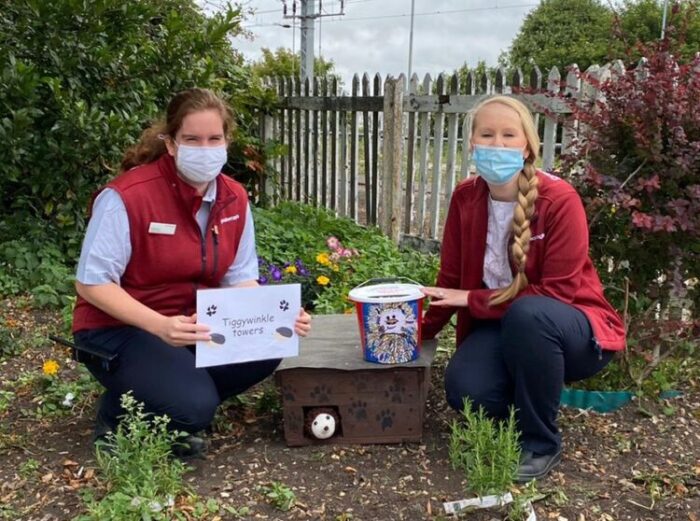Ely rail station receives Hedgehog House as staff raise money for local sanctuary
August 17, 2021

Kind-hearted staff at Ely rail station have raised funds to help a local hedgehog sanctuary after receiving a hedgehog house for their new station wildlife garden.
They raised £147.50 for Ryston Rachel’s Hedgehog Hotel, a self-funded Hedgehog Rescue in Downham Market which has been rescuing and rehabilitating hedgehogs for the past 10 years. Greater Angila staff formally opened the hedgehog hotel, named ‘Tiggywinkle Towers’, earlier this month and held a ‘Guess the name of the hedgehog’ competition fundraiser.
The hotel was made and donated to the station garden by Adrian Sutterby, one of Greater Anglia’s Station Adoption volunteers who helps to look after March station. The new station wildlife garden will help to support local wildlife including insects and small invertebrates. It also features an insect house handmade by Ely station team member, William Ashworth, from old pallets that would otherwise have been thrown away. The station team hopes that hedgehogs – who are now so endangered that they could be extinct within five years – can find sanctuary there too.
The garden was created by Ely station staff, led by Train Dispatcher, Jade Wilkinson, who said: “We started off making a wildlife garden during lockdown when things were really quiet around the station. Someone donated a bug hotel, which we called ‘Buggenham Palace’ and then we started thinking of other things we could make for our local wildlife so we purchased a bird house for a little robin who kept visiting. Then we came up with the idea of a hedgehog house too and as it was being made we actually saw a hedgehog in our wildlife garden and thought he must be waiting for his new house!”
Greater Anglia’s Customer and Community Engagement Manager, Alan Neville, who leads the company’s Station Adoption initiative, commented: “It’s wonderful to see the staff at Ely station working hand in hand with one of our station adopters to create this lovely new wildlife haven which it is hoped will have a positive effect in protecting the area’s vulnerable species and improve biodiversity locally.
“This is all helping the railway in East Anglia to lead the green recovery from the pandemic by being a much greener way to travel – and our new fleet of trains will contribute even more thanks to their more environmentally friendly features which reduce CO2 and particulate emissions in the region further still and offer a convenient, comfortable alternative to the car.”
Rail stations in East Anglia are increasingly becoming havens for local wildlife with land the equivalent of five Olympic-sized swimming pools being transformed into thriving gardens.
Greater Anglia’s team of station adopters – who help to look after their rail stations for the benefit of their communities – increased the total area of station garden across the network by 14 per cent last year and devoted much of it to creating wildlife friendly areas. The gardens, some of which have been developed over many years, are becoming havens for local wildlife populations – with the railway increasingly being recognised by ecologists as a ‘green corridor’ which provides a sanctuary for many different kinds of flora and fauna.
In a recent survey, Greater Anglia station adopters reported a wide range of creatures visiting their stations including many different types of butterflies as well as bees, slow worms, bats, foxes, deer and many varieties of birds, recording over 200 different species.